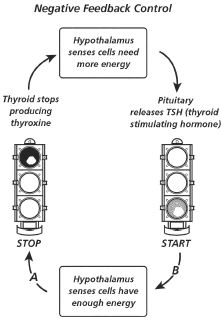Multiple Choice
Identify the choice that best completes the
statement or answers the question.
|
|
|
1.
|
Why do hormones cause changes only in specific body organs?
a. | A hormone works only through negative feedback. | b. | A hormone is
produced only in the location where it is needed. | c. | A hormone interacts with target organ cells,
which fit together with that hormone. |
|
|
|
2.
|
The endocrine system acts on the body through chemical protiens
called
a. | target cells. | b. | blood and saliva. | c. | hormones. |
|
|
|
3.
|
The endocrine system produces chemical hormones that
a. | control both daily activities and long-term changes within the
body. | b. | require only a system of nerves to control many body activities. | c. | begin to function
only after puberty. |
|
|
|
4.
|
Which master endocrine gland links the endocrine system and
the nervous system?
a. | hypothalamus | b. | pituitary gland | c. | thyroid
gland |
|
|
|
5.
|
Which endocrine gland communicates with the hypothalamus and controls
many body activities, including growth from infancy to adulthood?
a. | thyroid gland | b. | pituitary gland | c. | adrenal
glands |
|
|
|
6.
|
The way the endocrine system maintains homeostasis is like
a
a. | violent thunderstorm that startles people and increases their
heartbeat. | b. | heating system that turns a furnace on and off to control a room’s
temperature. | c. | monthly cycle that releases an egg from an ovary. |
|
|
|
7.
|
Which of the following is an example of negative feedback in the
endocrine system?
a. | When the amount of a hormone reaches a certain level, the endocrine system stops the
release of that hormone. | b. | When a hormone travels through the bloodstream,
it will interact only with its target cells. | c. | When people are startled by a frightening
event, their heart beats faster. |
|
|
|
8.
|
The endocrine system often uses a negative feedback process to
a. | bring about fertilization. | b. | maintain homeostasis. | c. | control the
production of eggs and sperm. |
|
Matching
|
|
|
Match the correct gland with the function a. | Hypothamus | f. | Adrenal | b. | Pituitary | g. | Ovaries | c. | Thyroid | h. | Testes | d. | Parathyroid | i. | Pancreas | e. | Thymus |
|
|
|
9.
|
produces adrenaline to activate the flight fight response
|
|
|
10.
|
controls the production of white blood cells to fight disease
|
|
|
11.
|
A master gland that controls other glands and connects endocrine and nervous
systems
|
|
|
12.
|
Produces estrogen to control female reproductive system
|
|
|
13.
|
Produces testosterone to control male reproductive system
|
|
|
14.
|
Controls calcium levels
|
|
|
15.
|
Controls sugar levels with insulin
|
|
|
16.
|
Controls energy levels with the hormone thyroxine
|
|
|
17.
|
Controls growth with HGH
|
Essay
|
|
|
18.
|
Explain how the following NEGATIVE FEEDBACK system works. 
|